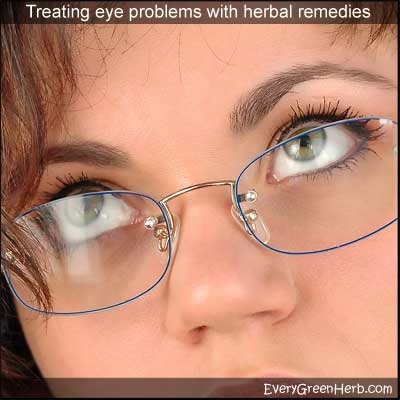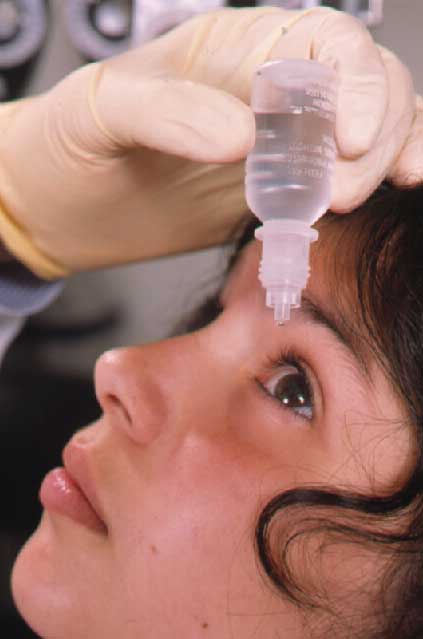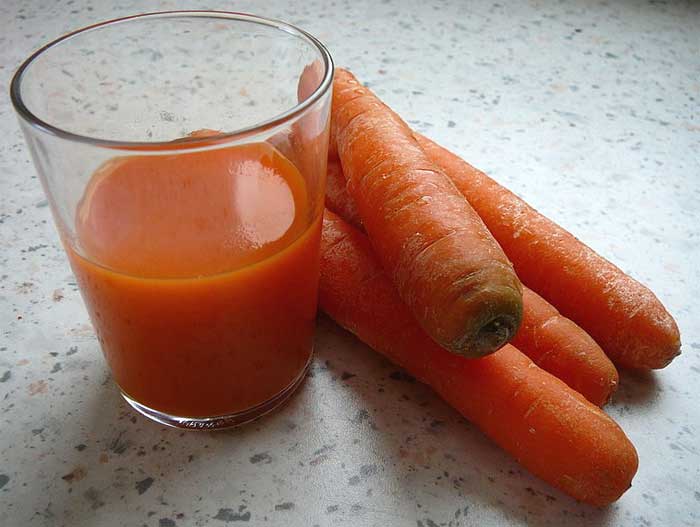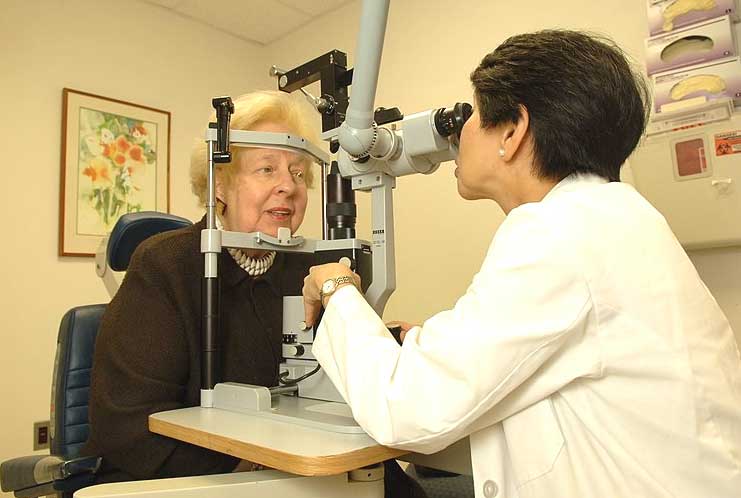Herbs for the eyes
Treating eye problems with herbal medicine
Herbal compresses are especially soothing to tired, dry, irritated eyes. An easy way to make an eye compress is with herbal tea bags.

Anyone with can do it. Gently place wet, warm tea bags such as green tea, breakfast tea, chickweed, or eyebright tea over closed eyes. Leave for 10 to 20 minutes. Eyes will feel strong and refreshed.
Scientific studies on herbs and the eyes
Diseases such as macular degeneration, glaucoma, diabetic retinopathy, cataract, and retinitis pigmentosa are common problems that can be delayed and treated with herbal remedies.
With a majority of modern drugs (74%) having their origins in natural compounds, this is not a surprise. Most plants used in herbal medicine are anti-inflammatory. They have strong antioxidant properties that can heal and protect.
Since there are no cures for glaucoma, cataracts, and age-related macular degeneration, preventive measures with herbs and lifestyle changes are our best options. Supplements containing curcumin, lutein, zeaxanthin, saffron, catechin, ginkgo biloba extract, ginseng, resveratrol, danshen, and quercetin are good choices for eye health.
Studies show that taking regular doses of medicinal herbs (by mouth) help prevent degradation of vital eye proteins needed for good vision.
- Curcumin, extracted from turmeric, has a long history of use against inflammation. It has the ability to reduce oxidative stress in the cells.
- Lutein and zeaxanthin are carotenoids, also known as macular pigments. They are found in colorful fruits and vegetables such as kale, spinach, corn, kiwi, and red grapes. These substances act as light filters in the eye. By absorbing blue light, they protect the eye from mascular degeneration.
- Saffron is a spice with strong anti-toxic properties. It protects the cells inside the eye from toxins and bright light.
- Catechin is a strong antioxidant found in green tea. This substance helps protect the retina photoreceptors inside the eye. It is also shown to help delay age-related eye diseases.
- Ginkgo biloba has undergone many studies. It contains high levels of flavonoids and terpenoids. These substances protect the optic nerve from damage. It also shows promise in the treatment of glaucoma.
- Ginseng contains steroidal saponins that increase retinal blood flow which helps protect against eye disease.
- Resveratrol, extracted from pine bark and grape seeds, helps protect from diabetic retinopahty. It is also found in peanuts, red grapes, and cranberries. Studies are underway to see if resveratrol might be an effective treatment for vascular dysfunction in the retina. Resveratrol shows great promise for helping to prevent or delay most eye diseases.
- Danshen, or Asian red sage, is a strong antioxidant and anti-inflammatory herb. It shows promise in the treatment of oxidative stress in the eyes.
- Quercetin, found in green tea, brassica vegetables like cabbage, and berries, is a well known flavonoid. It has strong anti-cataract properties.
- Cannabis is shown to reduce eye pressure for up to three hours. This is good news for anyone diagnosed with glaucoma.

More herbs for eye health
Some herbs are especially suited for treating eye problems. Eyebright, chickweed, elderflower, cat's claw, fennel, garlic, and chamomile are known to help heal many eye problems including conjunctivitis.
Bilberry is good for improving night vision.
Mild eye irritation can be treated at home with herbal remedies.
The eyes can suffer from many problems including everything from allergies to serious disease. From redness to loss of vision, the range of conditions and diseases that affect the eye are varied and wide.
Read more about using herbs to treat allergies.
For any trauma or problem that could cause sight loss, seek professional help.
Symptoms of conjunctivitis
Symptoms of conjunctivitis include red, itchy eyes with a yellow discharge and may be soothed with applications of a warm herbal compress. Other symptoms of conjunctivitis include a gritty feeling in the eyes, sensitivity to light, soreness, swelling, red eyes, and scaly eyelids.
Be sure to strain homemade eye washes.
Herbal eye-washes and eye-drops were used for centuries to treat conjunctivitis and other eye problems. If using a homemade product, please use caution and a lot of common sense.
A tiny piece of foreign matter from herbal plant material, a microscopic grain of sand, or water contaminates like algae can cause more harm than good. If you use a homemade wash or drop, straining through doubled coffee filters can help remove damaging particles.

Making eyebright eye wash
In this video, Something Worth Seeing, shows us how to make an herbal eye wash out of eyebright.
Foreign object in the eye
If you can see the offending eyelash, gnat, or dust particle, gently dab it out with a damp tissue or clean fingertip. If a glass, metal, stone, or wood particle is embedded in the eye, seek emergency help immediately.
Puffy eyes?
Cucumber slices and cold, wet tea bags are good for puffy and tired eyes. So are cool compresses made with rose water, calendula, cornflower, or strawberry leaves.
Mild eye infections and irritations can be soothed with agrimony tea compresses. Leave on eyes for fifteen minutes three or four times a day.
When suffering from an eye infection, echinacea and yellowroot tea should be taken internally three times a day for one week to build immunity. Other herbs to try for eye health include bilberry, parsley root, aloe vera, ginkgo biloba, burdock root, hawthorn, yellow dock root, dandelion root, and barley grass.
Use in a compress as often as needed. Be gentle, do not apply pressure to the eyes.

Use calendula to help heal a sty.
Calendula compresses are extremely useful in the treatment of sties. Apply often until the sore is healed.
Blurred vision calls for building up the liver.
Weak eyes and blurred vision can be a sign of liver malfunction. This may require simple lifestyle changes.
A good diet with lots of vitamins, including vitamin A and C, can really help. Eat more vegetables and avoid processed foods as much as possible.
Read more about the healing properties of vitamins and minerals.
A healthy drink recipe for the liver and eyes includes a cup of carrot juice, a cup of eyebright tea, a tablespoon of wheat germ, a teaspoon of powdered rosehips, a teaspoon of honey to taste, a teaspoon of sesame seeds, a teaspoon of brewer's yeast, and a teaspoon of ground kelp.
If eyesight suddenly becomes blurred, seek medical help as soon as possible.
Stress can cause eye problems.
Stress causes many eye problems. Seeing sparks of light or color with your eyes closed is a sign that the body needs to relax. Try sipping rosemary tea and inhaling lavender essential oil while resting in a peaceful atmosphere.
Find herbs that fight stress.
Blink regularly to keep eyes moist.
There are many ways to improve vision.
- Blink regularly.
- Change your focus every five minutes when driving or using the computer.
- Massage the temples and skin between the brows frequently when doing any close-up work.
- Squeeze eyes shut and then open them wide, ten or fifteen times to increase blood flow to the eyes.
Avoid things that harm the eyes.
To improve eye health, avoid all smoky environments. If it is smoky outside, stay indoors if possible. Read more about recovering from smoke.
Also avoid air pollution, strong diuretics, aspirin, antihistamines, nicotine, hard liquor, cocaine, and methamphetamine when suffering from any eye problem.
To slow the progression of macular degeneration wear amber or blue wrap-around sunglasses especially while driving, and add extra antioxidants (like colorful berries and fruits) to the diet. Wear special glasses which have a yellow tint to protect from blue light coming from computer and phone screens.

*Never use essential oils around the eyes. Always consult with your health care professional before using any herbal remedy.
Sources:
https://www.ncbi.nlm.nih.gov/pmc/articles/PMC3703386/
https://www.ncbi.nlm.nih.gov/pmc/articles/PMC7355812/
https://www.motherearthliving.com/health-and-wellness/ask-the-herbalist-herbs-for-healthy-eyes/
Blessings to you and yours!
Thanks so much for reading my blog. Jan.

*Note - the information on this website has not been evaluated by the Food and Drug Administration.
© 2005-2024 website design and content by Janice Boling